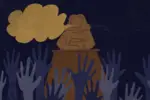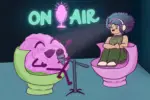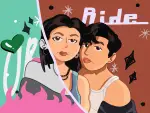Everyone has a story to tell. Whether it’s about love or heartbreak, a child or a parent, planet Earth or the house you live in — most people have something worth saying, even when we don’t think we do. The way we share these stories is different for every person. Some use their lives as inspiration for fiction, some tell events exactly how they occurred. And sometimes these stories aren’t even about us; instead they focus on our neighbors, friends or even people we just met.
Stories take shape in different forms. They’re expressed through film, photography, sculpture — even an Instagram post. But for some, the only way to share experiences manifests in words, punctuation and paragraphs.
It seems that knowing how to write and being a writer are different things. And possessing the basic skills, in many ways, makes it harder to understand what to actually do with them. Nothing is more frustrating than knowing what to say without knowing how to say it. So where does someone with a passion for sentences and clauses start their journey? Enter The New York Times Learning Network.
The New York Times is known for its high journalistic standards, ethically and factually reporting on current events and news. But some writers have no intention of being journalists, or at least not in the traditional sense of the word. Instead, they’d rather write novels, personal essays or cultural commentary. While the original printed newspaper may focus on what the title implies — news — the digital site publishes a variety of writing genres and styles. And this is exactly what is used in The Learning Network’s lessons.
The Learning Network is organized as digital lessons intended for “middle and high school teachers and students.” However, they recognize the content is also used in elementary and college classrooms with “much of it appropriate for both.” And who says you can’t use it for individualized study too?
The three missions of The Learning Network are to “connect the classroom to the world,” “give students a voice” and to “promote critical and creative thinking.” I’ve always adhered to the philosophy “to write well, is to think well” so the last one really hits home for me.
The idea behind The Learning Network is to teach through example. Real, NYT-published essays and articles are annotated and explained so students can understand what makes these pieces so successful. These “mentor texts” contextualize lessons and give learners something to emulate.
There are seven fully-structured units to take advantage of. Whether you’re not sure what type of writing you want to do, or you’re convinced there’s only one genre for you, it never hurts to broaden your skills and get acquainted with as many styles as possible. If anything, it will only add value to the work you’re already doing.
The units are broken up as follows: the personal narrative essay, the review, analysis and connection-making, informational writing, argumentative writing, writing for podcasts and independent reading and writing.
You might look at the list and realize it’s all nonfiction writing. There’s no short story, novel or poetry section. You would be right. However, I stand steadfast in the belief that improving any one type of writing will improve all of your writing. And just as good writing comes from good thinking, the inverse is true as well. Good thinking comes from good writing, and honing your skills in one style will help you think critically and purposefully— translating to any other genre you may choose.
One of my favorite lessons, “Explaining Why a Topic Matters,” provides an important message for most of us who want to share stories through the written word. It’s often a challenging moment for a writer. Just because you’re obsessed with a movie or a book, or something out of this world that happened in your personal life, why should anyone else care? Knowing why you write is just as important as knowing why someone else reads. What is the broader context that makes this story applicable to everyone else? If the point of storytelling is to bring people together, as the writer you have to show your readers how they’re included.
Other great lessons include addressing audiences with book reviews, making arguments in music reviews with descriptive details and dropping a reader into a scene. These lessons illustrate techniques we respond to naturally as readers, but often forget we can use as writers. Contextualized writing examples and practice exercises only make the lessons more digestible.
Apart from learning by reading, students can also learn by doing. There are often many contests that students can enter throughout the school year with prizes often including publication in The New York Times — talk about a dream come true. Currently, students can enter the third annual podcast contest.
If you’re like me and you’ve already graduated high school or are older than the contest age limit, you can still practice your skills using the hundreds of writing prompts, and maybe even pitch a finished piece to a NYT editor. Some popular, contributor-generated columns you could consider pitching include “Modern Love” and op-eds. Your chances of getting published are probably much higher if you follow their tried and tested advice.
I’ve been using The Learning Network for the past month or so; I honestly feel upset I didn’t know about it sooner. While I’ve seen my writing skills improve, more importantly, I’ve seen my reading skills improve. I’m able to look at any work critically, recognizing techniques and analyzing why they’re effective. In this way, this means I’m learning all the time, and I’m getting better all the time too.
Regardless of skill, experience or professional goals, having a free resource to develop your writing abilities from such a high-profile organization is no small gift. It could be just the tool you need to find your voice, story, maybe even your purpose. Maybe you’re a writer who wants to brush up on your skills to reach a larger audience. Or maybe you’re someone who only knows how to write but wants to become a writer. The New York Times Learning Network can help you get there. Stories can bring us together and well-told stories ensure we’re never far apart.
















